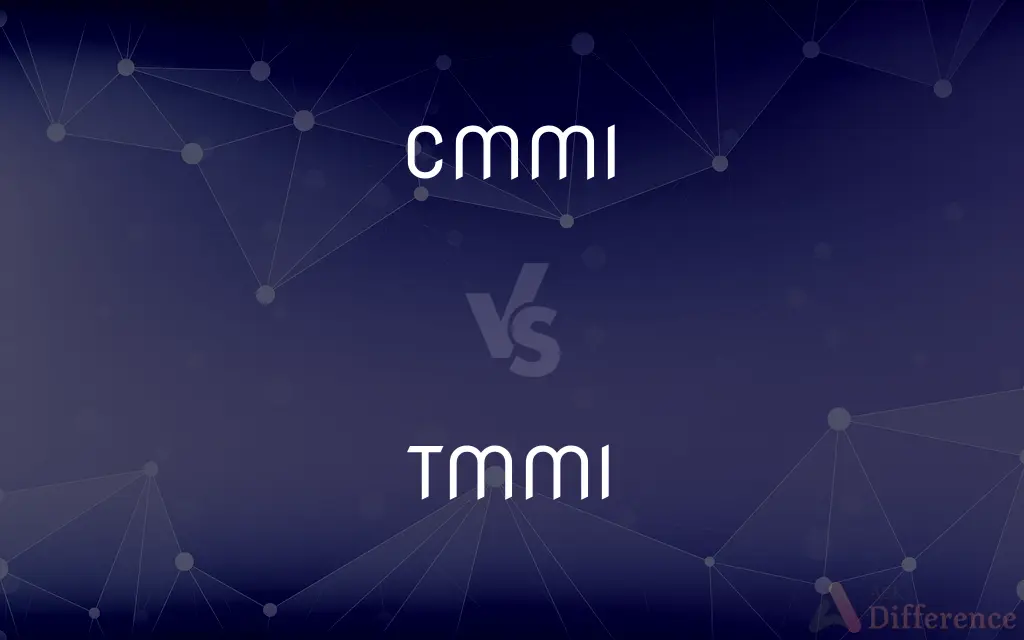CMMI vs. TMMI — What's the Difference?
By Tayyaba Rehman — Published on December 20, 2023
CMMI (Capability Maturity Model Integration) focuses on process improvement across projects, departments, and organizations, while TMMI (Test Maturity Model Integration) specifically targets the maturity of testing processes.

Difference Between CMMI and TMMI
Table of Contents
ADVERTISEMENT
Key Differences
CMMI (Capability Maturity Model Integration) is a process-level improvement training and appraisal program. It is designed to guide organizations in improving their processes and ensuring efficient delivery of products and services. TMMI (Test Maturity Model Integration) on the other hand, is a detailed model for the maturity of test and quality-related processes.
While CMMI addresses broader aspects of process improvement across different sectors like software development, service provision, and product acquisition, TMMI specifically zooms into the testing domain. TMMI offers a pathway for structured testing processes, ensuring testing efficacy and efficiency.
Organizations that adopt CMMI aim to improve their overall performance, reduce risks in process management, and ensure timely delivery. TMMI, in contrast, enables organizations to achieve high-quality products by focusing solely on refining their testing processes.
The inception of CMMI was to provide businesses with guidelines to develop and maintain high-quality products and services. TMMI emerged as a need to standardize and improve the testing processes which are a crucial part of software development and quality assurance.
In essence, while CMMI and TMMI both aim at process improvement, their scopes differ. CMMI has a more generalized approach, while TMMI is specialized in the realm of testing.
ADVERTISEMENT
Comparison Chart
Focus
Process improvement across organizations
Maturity of testing processes
Application Domain
Multiple sectors (software, services, acquisition)
Software Testing
Main Objective
Improve organizational performance & reduce risks
Achieve high-quality products via better testing
Foundational Approach
Generalized approach for process enhancement
Specialized in testing domain
Primary Use
Develop & maintain high-quality products/services
Standardize & improve testing processes
Compare with Definitions
CMMI
CMMI offers best practices that help in reducing risks associated with product development and service provision.
By integrating CMMI, XYZ Tech reduced the number of defects in its product releases.
TMMI
TMMI provides guidelines for structured testing processes, ensuring efficiency.
By implementing TMMI, XYZ Labs enhanced the robustness of their testing procedures.
CMMI
CMMI aims at guiding organizations to ensure efficient and timely product delivery.
With CMMI processes in place, GHI Enterprises improved its product delivery timelines.
TMMI
TMMI offers a standardized approach to testing, targeting quality assurance.
GHI Software Solutions integrated TMMI to ensure consistent testing outcomes across projects.
CMMI
CMMI provides a structured approach for improving processes across diverse domains.
The versatility of CMMI allowed DEF Industries to implement it across their software and service departments.
TMMI
TMMI is designed to help organizations achieve high-quality software products.
DEF Tech, with TMMI practices, saw a significant reduction in post-release defects.
CMMI
CMMI is a tool for businesses to achieve their quality and performance objectives.
QRS Inc. leveraged CMMI to set and achieve higher operational goals.
TMMI
TMMI serves as a benchmark for organizations to measure and improve their testing maturity.
QRS Development assessed its testing maturity using TMMI standards.
CMMI
CMMI is a process improvement framework for organizations to enhance their performance and operational efficiency.
To streamline their software development, ABC Corp adopted CMMI practices.
TMMI
TMMI is a model that focuses on the maturity of test processes in software development.
ABC Software adopted TMMI to refine their software testing methodologies.
Common Curiosities
What does TMMI stand for?
TMMI stands for Test Maturity Model Integration, focusing on the maturity of testing processes.
Is TMMI a subset of CMMI?
No, TMMI is a separate model, specifically designed for the testing domain.
Are there certification levels in CMMI?
Yes, CMMI has maturity levels ranging from 1 to 5, indicating process improvement maturity.
Can TMMI be used outside of software testing?
TMMI is primarily designed for software testing, but its principles might be applied in related testing domains.
What is CMMI?
CMMI is a framework for improving processes across organizations, ensuring product and service excellence.
How does CMMI differ from TMMI?
CMMI focuses on overall process improvement, while TMMI is specific to testing processes.
Why should an organization adopt CMMI?
Adopting CMMI can help organizations reduce risks, improve performance, and ensure product/service quality.
What are the benefits of TMMI?
TMMI helps standardize testing processes, ensuring higher software quality and fewer defects.
Can a company implement both CMMI and TMMI?
Yes, a company can adopt both, with CMMI for overall process improvement and TMMI for enhanced testing processes.
Is TMMI only for large software development companies?
No, TMMI can be beneficial for any organization, large or small, that aims to improve its testing processes.
Who developed CMMI?
CMMI was developed by the Software Engineering Institute (SEI) at Carnegie Mellon University.
How does CMMI impact product quality?
By streamlining processes and reducing risks, CMMI ensures the development and delivery of high-quality products.
Which industries commonly use CMMI?
Industries like software development, service provision, and product acquisition commonly use CMMI.
Is TMMI recognized globally?
Yes, TMMI is recognized globally as a standard for evaluating and improving testing processes.
How does TMMI complement other quality assurance practices?
TMMI provides a structured approach to testing, which can enhance other QA practices, ensuring better outcomes.
Share Your Discovery

Previous Comparison
Profit Maximization vs. Wealth Maximization
Next Comparison
Impetigo vs. HerpesAuthor Spotlight
Written by
Tayyaba RehmanTayyaba Rehman is a distinguished writer, currently serving as a primary contributor to askdifference.com. As a researcher in semantics and etymology, Tayyaba's passion for the complexity of languages and their distinctions has found a perfect home on the platform. Tayyaba delves into the intricacies of language, distinguishing between commonly confused words and phrases, thereby providing clarity for readers worldwide.












































